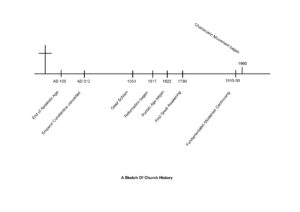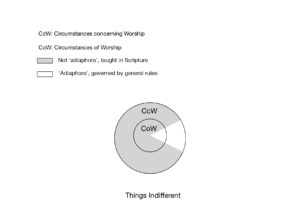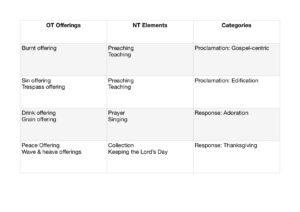Webinar Talk1: Church History And Worship (Joshua 4:1-7)
o We believe in ‘sola scriptura’ (2 Tim. 3:16-17). There must be form of worship taught in the Bible.
– Historically, perversion occurred to worship, just as to church government, Godhead, salvation, missions.
– The Reformation of the 16th century formed a watershed in history of the church.
= We will trace history to the Reformation and after, to understand where we stand today.
I. Overview of church history.

Note the highlights.
: (i) After apostles, persecution from without, heresies from within.
: (ii) After Constantine, sacral religion established, dissent driven underground.
: (iii) Reformation, leading to age of Reformers & Puritans.
: Great Evangelical Revival, attention of the church diverted from work of reformation.
: After 1930, realignment, until rise of Charismatic movement & recovery of Reformed faith. Worship war.
II. The Reformation
1. Age of Reformation (1500-1600)
– John Wycliff (1320-1384), John Huss (1369-1415), and William Tyndale (1494-1536).
– Martin Luther used by God to trigger of Reformation on 31 October 1517. John Calvin systematised doctrine.
– The five sola’s of the Reformation: sola scriptura, sola gratia, sola fide, solus Christus, soli Deo gloria.
2. Age of the Puritans (1600-1700)
– Continental Europe: Three Forms of Unity, consisting of the Belgic Confession, the Canons of Dort, and the Heidelberg Catechism
– Britain: Westminster Confession, Savoy Declaration, 1689 Confession.
– The Great Ejection (1662): Ch. of England reverted to the Book of Common Prayer which included the 39 Articles of Faith.
III. The four forms of worship
1. The Puritans were agreed on doctrine of salvation: Calvinism
– They were disagreed on church government: Episcopalism, Presbyterianism, Independency (Congregationalism).
– In worship, generally agreed on Regulative Principle (held by Calvin), while the Ch. of England held to Normative Principle. RC church held to Integrative Principle. Deviant groups (Quakers, Ranters, Seekers, Sabbatarian Baptists) held to Progressive Principle.
2. The biblical form of worship was not pursued by the Reformers & Puritans. Possible reasons include:
– (i) There were too many issues to handle after more than 1000 years of Medieval darkness.
– (ii) The Focus on some truths resulted in others being overlooked.
– (iii) The unorthodox groups were suppressed by the civil authorities, such that the Puritans focussed only on matters that differed between themselves.
– (iv) Other reasons may be cited: political turmoil, persecution of the dissenters, distraction by doctrinal aberrations, exhaustion from inter-denominational and intra-denominational debates, etc.
= The rise of the Charismatic movement and the recovery of interest in Reformed theology in the 1960’s resulted in the “worship war”: Regulative Principle versus Progressive Principle. Many hold to Normative Principle are influenced by Progressive Worship.
Webinar Talk2: The Regulative Principle (Lev. 9:22-10:3) Sept. 2020
o We will do four things: (i) Summarise the four forms of worship; (ii) Narrow our choices to two; (iii) Show from the Bible the correctness of the RP; (iv) Give a full definition of the RP.
1. Four principles governing worship has come down to us historically.
– (i) The Integrative Principle, held by the Roman Catholic Church and the Orthodox Churches states that “In the worship of God, whatever is taught in Scripture and the tradition of the church is permissible.”
– (ii) The Normative Principle held by Lutheran churches and the Church of England states that “In the worship of God, whatever is not forbidden by Scripture is permissible.”
– (iii) The Regulative Principle held by the continental Reformed churches and the Puritans of Britain is commonly understood as, “In the worship of God, whatever is commanded in Scripture must be obeyed, while whatever is not commanded in Scripture must be rejected.”
– (iv) The Progressive Principle was held by various dissenting groups down the centuries and may be stated as “In the worship of God, Scripture provides general guidelines to be followed while allowing for freedom in personal preferences and expressions.”
2. The Reformation of the 16th century recovered the doctrine of ‘sola scriptura’ which states that Scripture is the only authority in all matters of faith and practice. The application of this doctrine to worship and church government by the Reformers and the Puritans led to the formulation of the Normative Principle and the Regulative Principle.
– Today, most Evangelical Churches hold to the NP, either knowingly or unknowingly.
– Today nearly all Reformed churches hold to the RP, some more rigidly, others less so.
3. The Regulative Principle may be shown to be more consistent with the teaching of Scripture compared to the other principles of worship advocated by others.
– The incident of Abel’s offering being accepted by God instead of that of Cain in Genesis 4:1-7.
– The incident of Aaron’s two sons being struck dead for offering “profane fire” in Leviticus 10:1-3.
– The incident of Aaron and the children of Israel worshipping the golden calf in Exodus 32 support the Regulative Principle.
– In the New Testament, passages such as Matthew 15:9; 28:18-20; Colossians 2:22-23, and Revelation 22:18-19 would lend support to the Regulative Principle.
4. The definition of the Regulative Principle adopted by many today is deficient compared to how it was traditionally understood. Advocates of the Regulative Principle have not helped their own cause by:
– (i) giving the wrong impression that only the explicit commands of Scripture are be followed instead of the teaching of Scripture; (Should include commands, precepts, principles, examples).
– (ii) giving a truncated definition of the Regulative Principle in which the qualifying statement on ‘things indifferent’ is omitted;
– (iii) confusing the circumstances concerning worship with the circumstances of worship, the former of which is all-embracing while the latter concerns only the execution of the elements of worship.

= A more complete definition is, “In the worship of God, whatever is taught in Scripture must be obeyed, while whatever is not taught in Scripture must be rejected, except for the circumstances concerning worship which must be ordered according to common sense, Christian prudence, and the general rules of Scripture.”
Webinar Talk3: Principles Of Worship (John 4:21-24)
o We will do three things: (i) Delineate on the “Things indifferent”; (ii) Show the relevance of the Ten Commandments to worship; (iii) Show how the OT offerings affect NT worship.
1. Things Indifferent must be governed by common sense, Christian prudence, and the general rules of Scripture. What are the general rules of Scripture?
(Slide 4)
– Doing all things:
: (i) to the glory of God (1 Cor. 10:31);
: (ii) decently and in order (1 Cor. 14:40);
: (iii)to edify the church (1 Cor. 14:26; 2 Cor. 10:8 ; Eph. 4:29);
: (iv) not to stumble weaker brethren (Matt. 18:6; Rom. 14:13; 15:1-2);
: (v) not to dishonour God before the world (Lev. 10:3; Rom. 12:17; 14:16; 2 Cor. 8:21; 1 Pet. 2:12);
: (vi) according to the simplicity that is in Christ (2 Cor. 1:12; 11:3); and
: (vii) to promote godliness, not against the truth but for the truth (2 Cor. 13:8).
– Summary:Doing all things: (i) to the glory of God; (ii) decently and in order; (iii) for edification; and (iv) in simplicity.
= Leviticus 10:3, “By those who come near Me I must be regarded as holy; and before all the people I must be glorified.”
= John 4:24, “God is Spirit, and those who worship Him must worship in spirit and truth.”
2. The Ten Commandments are a summary of the Moral Law of God. It is of abiding relevance. Matt. 5:17, “Do not think that I came to destroy the Law or the Prophets. I did not come to destroy but to fulfill.” The first four Commandments are:
- – (i) “You shall have no other gods before Me (Exod. 20:3).”
- (ii) “You shall not make for yourself a carved image—any likeness of anything that is in heaven above, or that is in the earth beneath, or that is in the water under the earth; you shall not bow down to them nor serve them (Exod. 20:4-5).”
- (iii) “You shall not take the name of the Lord your God in vain, for the Lord will not hold him
guiltless who takes His name in vain (Exod. 20:7).”
– (iv) “Remember the Sabbath day, to keep it holy. Six days you shall labor and do all your work, but the seventh day is the Sabbath of the Lord your God. In it you shall do no work: you, nor your son, nor your daughter, nor your male servant, nor your female servant, nor your cattle, nor your stranger who is within your gates (Exod. 20:8-10).”
– These teach the object, the manner, the attitude, and the day of worship, respectively. The manner of worship gives us the elements of worship, while the attitude of worship governs the circumstances of worship.
3. The OT elements of worship have been replaced by the NT equivalents.

– The burnt offering = Preaching & teaching = Proclamation: Gospel-centric
– Sin offering & trespass offering = Preaching & teaching = Proclamation: Edification
– Drink offering & Grain offering = Prayer & Singing = Response: Adoration
– Peace offering & Wave offering = Collection & Keeping Lord’s Day = Response: Thanksgiving
= Object of worship: Trinitarian God
= Manner of worship: Proclamation, Response by words, Response by Actions (Offertory).
= Attitude of worship: In spirit & truth, marking us out as God’s people.